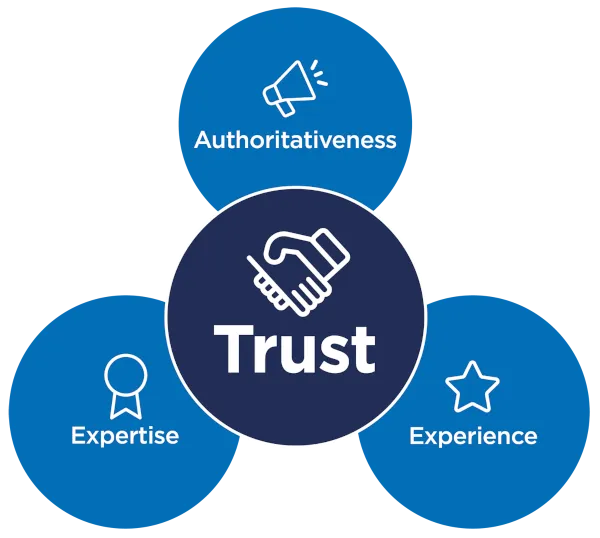Supporting you with relevant insight
Mastering SEO: A Financial Adviser's Guide
Learn how to master your website's SEO and find out how to improve your website visibility, engage with online visitors, and which common online pitfalls to avoid.

Sarah Oxley
22 Oct, 2024

Subscribe to our Newsletter on all things later finance
Join our monthly newsletter today.
By subscribing, you agree to our Privacy Policy and to receive our newsletter.
Search Engine Optimisation (SEO) is the practice of enhancing a website to improve its visibility in search engines, thereby making it easier for potential customers to find your business online.
This is important for financial advisers like yourself as according to Mintel's 2023 Financial Report (1), 60% of consumers agree that accessing advice online or remotely is convenient and Adobe's 2022 Trust Report (2) found that 72% of consumers say relevant content delivered at the right time and place boosts their trust, while poor website experiences can severely damage it.
In this SEO guide for financial advisers specialising in later life lending, we'll explore how to make your website relevant to your audience. Please note, SEO is purely organic, and this guide doesn't touch upon paid digital marketing tips.
Cover the basics
The main function of search engines is to connect people searching online with the information they're looking for. The three main things to consider when creating or reviewing your website for SEO are:
-
Relevancy : Understanding your audience helps you create relevant content that includes keywords and search terms your audience is using.
-
Journey: Ensure your website visitors can easily and quickly find what they're looking for. Keep your navigation clear and make your call to action - such as contacting you to discuss later life borrowing options—simple and straightforward.
-
Technical setup: Websites should load quickly and be mobile-friendly. While your web team or template provider can handle this, it's wise to audit the basics. Tools like SEMrush, Ahrefs, and MOZ offer free overviews, but consulting an expert is best for in-depth technical needs.
By covering the basics, you've got a good foundation for new ideas and future growth.
Make your website relevant by knowing your target audienc
When planning out your website pages and blog articles always keep the user (website visitor) in mind. Be sure to consider:
-
What problem they face?
-
How your service could help them?
-
What's the main action you need them to take away from a web page? (Overengineering a web page is a common pitfall)
Your audience is looking for a relevant website to help them find the answers to their questions. Your main aim is to communicate how your service solves their problem.

While this sounds easy, you also need to keep in mind at what stage of their journey the person is in. For example, someone who has spent time researching ”how does equity release work?” is more likely to be ready to be encouraged to call you now, while someone who has just started looking into ”how can I get a mortgage when I'm retired?” will be put off by a pushy message.
Your website has the task of serving multiple needs at once, while also keeping in mind how you can engage with people and consequently generate leads.
Stay up to date with your audience
Your day to day is of course very busy, but it's still vital for you to stay up to date with the market fluctuations and changes in consumer behaviour. At Pure, we understand that this is a tall task, so to make things easier for financial advisers, we've developed several resources for you which are updated regularly:
-
Quarterly Reports: Explore later life finance trends including customer demographics in our quarterly market trend reports.
-
Average Equity Release Customers: We review our data to better understand the needs of the end-consumer. Find out more about 2024's average later life borrower.
-
Education guides: We've completed our own over 50s research and partnered with industry experts to create insightful ‘understanding your customer’ resources.
How to engage your audience
It's important that your website represents you but remember that it's not just about you. It's about solving your audience's problem no matter what stage of their journey they are in. Visual aids and systems like lifetime mortgage calculators, downloadable reports, and relatable case studies are options to engage with your audience.
Google's E-E-A-T

The acronym “E-E-A-T” stands for Experience, Expertise, Authoritativeness, and Trustworthiness. It's especially relevant for financial service companies as these are referred to by Google as “Your Money or Your Life” (YMYL) style websites, meaning more scrutiny on content and trust signals is placed on them.
The rise of misinformation plays a part in this additional scrutiny, however, by creating helpful, reliable and people-first content you can grow your brand's trustworthiness and authority.
To do this, it's important to think about these four questions:
-
Which problem you're addressing with your page or content? It's best to avoid overengineering a page and to likewise make sure the page has a purpose, as some topics may be better placed as a section on an existing page
-
How is your page or content laid out? When reviewing your page, ask yourself: Is it easy to scroll through to the relevant sections? Web pages need to be scannable as that's how people read online. A good page experience leaves a good impression on your audience, as well as fulfilling Google's best practice requirements.
-
Is it relatable to your audience? First-hand experience is relatable. Ask yourself if your website visitors can recognise themselves in this solution? People-first content for financial advisers includes relatable case studies, testimonials, and FAQ sections that answer real concerns.
-
Have you communicated your skills and expertise? Trust signals like reviews from customers, your qualifications, how you solved passed problems, and references to reliable sources to show your knowledge of the topic, are all important trust signals to your website visitors.
Of course, every website addresses Google's E-E-A-T in different ways, and it's therefore key to tailor it to your business.
How keywords can drive your website plans
Keywords shouldn't be used as a magical fix-all solution but as a tool for you to make the context of your service clear and in-line with what people are looking for.
Your aim is to be found by customers and to solve their problems. You can only do that if you understand these problems and how your audience is researching the answers.

The challenge for financial advisers is to rank in Google for the terms your customers are putting in, as well as helping the industry move away from past terminology. For now, we suggest a mix of equity release, lifetime mortgages, and later life borrowing keywords to ensure you can support customers who are at different stages of their journey.
There's no definitive list of which keywords you should use, as each business has different needs. Some things we can suggest are to have a mix of keywords in your strategy, for example:
-
Don't just chase after short keywords, combine these with phrases and questions ('long-tail keywords').
-
Think about informational, intent-based, and branded keywords.
-
Avoid forcing keywords into content it isn't related to. This can come across as a random tangent and could harm your trust signals.
-
Avoid keyword stuffing. This is a process where the same keyword is forced into copy as often as possible. What you write on your website needs to first and foremost be of value to your audience.
-
Sometimes the best source of keywords comes from your own conversations with clients. What questions keep coming up and which overarching topic does this keyword belong to?
Keywords to consider for later life lending
As there's no one size fits all keyword strategy, the list below is intended to serve as inspiration for your own research. It is by no means a definitive or complete list and rather serves as a starting point.
| Equity release | Later life borrowing | Retirement planning |
| What is equity release? | Later life financial planning | Retirement planning |
| Is equity release safe? | Later life borrowing | Plan your retirement income |
| How does equity release work? | Borrowing in retirement | Financial planning for retirement |
| Types of equity release | Later life lending mortgages | Wealth management |
| How to release equity from your home? | Mortgages for over 50s / 60s/ 70s | Preparing for retirement |
| Best equity release plans | Lifetime mortgages | Retirement solutions |
| Pros and cons of equity release | Types of lifetime mortgages | Retirement lending |
| Cost of equity release | How does a lifetime mortgage work? | Later life finance |
| Equity release calculator | Cost of a lifetime mortgage | Releasing equity for retirement |
The 5 most common SEO pitfalls for financial advisers
While these 5 most common SEO pitfalls happen across industries, I have noticed these more frequently in the financial services sector. It's completely understandable as there's often several complex topics to get across, important caveats to include for compliance reasons, and little time or available resources. However, being aware of the pitfalls is half the battle.
-
Forgetting about the person behind the website visit
If you haven't grabbed the user's attention by providing an answer, they'll soon keep searching.
-
Trying to do too much on one page
Hard to scroll pages with too many topics and too much going on, quickly become overwhelming.
-
Trying to do too little on one page
Having five pages to do the job of one page just results in the user having to dig for their answer. Keep things simple whenever possible.
-
Overengineering the navigation
While you probably know your website like the back of your hand, the user won't. Keep the navigation to your most important pages under three clicks or even less.
-
Treating SEO as a once then done fix
While there can be some quick wins in SEO, the best rewards come when you play the long game. By keeping an eye on how users engage with your website, you'll be able to put clear actions in place. Remember to Review, Refine, Refresh.
Useful SEO resources:
SEO is a fast-paced industry and can be overwhelming, however, the core principle of addressing the challenges your audience faces is at the heart of it.
Here are some resources to help you stay in the loop with search engine news and some resources to help your customers use the web with confidence:
Future resources: AI
It's good to keep an eye on future resources too. ChatGPT and other AI tools can help you identify some quick fixes. AI can identify some SEO issues on websites, such as broken links, missing meta tags, and slow page speeds. By pinpointing these quick fixes, AI can help you improve your website.
However, AI offers you tools and while it's important to know the best prompts, it's equally important to understand where AI needs human guidance and what tasks should not be delegated to it.
Did you know we've partnered with MMC learning to give financial advisers more insight into AI? You can catch up on the “ Generative AI Tools Masterclass ” webinar on our broker portal, simply log in to your account to watch it.
Not registered with us yet? No problem, you can do that via our online registration form. Register online today >
Simplify your marketing with tailored materials
SEO is just one aspect of digital marketing. To help you with your overall digital marketing efforts, our team has developed and fine-tuned a collection of digital marketing resources that you can tailor to your brand. Designed specifically for later life finance customers, this toolkit empowers you to grow your business. Created by marketing experts, it takes care of the creative and tone, so you don't have to.
Explore the full marketing toolkit here and discover how the digital marketing assets can support your business.
Sources:
(1) Mintel: UK Consumers and Financial Advice Market Report 2023
(2) Adobe: 2022 Trust Report: Customer trust is earned or broken with every experience
Our resources
Explore more of our resources tailored to supporting equity release advisers like you in succeeding.




